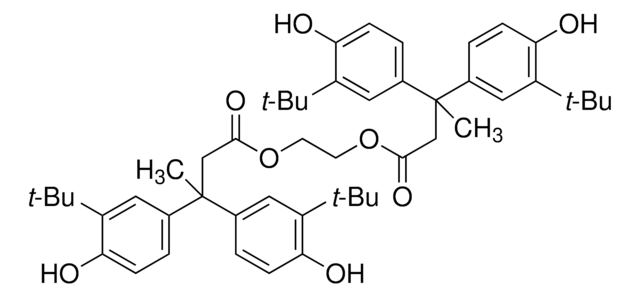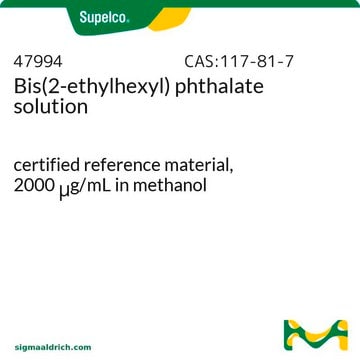P2155001
Bis(2-ethylhexyl) phthalate
European Pharmacopoeia (EP) Reference Standard
Sinónimos:
Bis(2-ethylhexyl) phthalate, DEHP, Phthalic acid bis(2-ethylhexyl ester), ‘Dioctyl’ phthalate
About This Item
Productos recomendados
grade
pharmaceutical primary standard
manufacturer/tradename
EDQM
bp
386 °C (lit.)
density
0.985 g/mL at 20 °C (lit.)
application(s)
pharmaceutical (small molecule)
format
neat
storage temp.
2-8°C
SMILES string
CCCCC(CC)COC(=O)c1ccccc1C(=O)OCC(CC)CCCC
InChI
1S/C24H38O4/c1-5-9-13-19(7-3)17-27-23(25)21-15-11-12-16-22(21)24(26)28-18-20(8-4)14-10-6-2/h11-12,15-16,19-20H,5-10,13-14,17-18H2,1-4H3
InChI key
BJQHLKABXJIVAM-UHFFFAOYSA-N
¿Está buscando productos similares? Visita Guía de comparación de productos
General description
Application
Packaging
Other Notes
signalword
Danger
hcodes
Hazard Classifications
Repr. 1B
Storage Class
6.1C - Combustible acute toxic Cat.3 / toxic compounds or compounds which causing chronic effects
wgk_germany
WGK 1
flash_point_f
392.0 °F - Pensky-Martens closed cup
flash_point_c
200 °C - Pensky-Martens closed cup
Elija entre una de las versiones más recientes:
Certificados de análisis (COA)
Lo sentimos, en este momento no disponemos de COAs para este producto en línea.
Si necesita más asistencia, póngase en contacto con Atención al cliente
¿Ya tiene este producto?
Encuentre la documentación para los productos que ha comprado recientemente en la Biblioteca de documentos.
Los clientes también vieron
Nuestro equipo de científicos tiene experiencia en todas las áreas de investigación: Ciencias de la vida, Ciencia de los materiales, Síntesis química, Cromatografía, Analítica y muchas otras.
Póngase en contacto con el Servicio técnico





